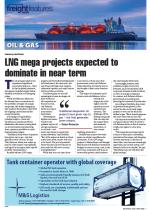Shipping lines are keeping a close eye on two major African projects – Afungi in the Cabo Delgado province in the North of Mozambique and the Tortue project in Senegal and Mauritania.According to Joris Jan Bakker, managing director and founder of Breadbox Shipping Lines, both projects have great potential from a shipping perspective with substantial cargo f lows from various sourcing areas around the globe. “Obstacles to opening up these opportunities could be to actually reach out and identify the key decision makers of the logistical chain as it is not always clear who is actually controlling the cargo f lows,” he said. “It can also be challenging to work with the various procurement platforms that have been put in place recently.”Breadbox offers multi-purpose services from most of the major sourcing areas to the African continent. “We offer three to four sailings every month from Europe to Central – West Africa, a monthly sailing from the East Mediterranean to West Africa, and have four to five geared coastal vessels permanently active in the inter-Africa trades.”According to Bakker, the company has a strong focus on the oil and gas sector which he believes holds significant opportunity for the continent. Operating in Africa, however, does not come without its challenges.“The oil price is, of course, at all times a major inf luence that can easily delay a project substantially or put it on hold until price levels justify further investment s,” he told Freight News. “A l s o , the political instability we see in certain regions in Africa is a major concern for the oil and gas sector. The present situation in Cabo Delgado in the north of Mozambique, for example, is jeopardising the progress of the Afungi project. Another example is the piracy threat in the Gulf of Guinea which has an enormous impact on shipments to Nigeria or neighbouring countries. Our vessels trading to Nigeria are, for instance, all accompanied by gunboats from point of entry of the high-risk area until the berth in Nigeria. This cost gets incorporated into the freight rate, hence increasing expenses in the supply chain.”Local infrastructure, or the lack thereof as is often the case, is another challenge not to be underestimated. Poorly equipped ports in West and East Africa or projects in remote areas could be very challenging on suppliers, said Bakker. Add to that the fact that oil and gas cargo f lows are very difficult in terms of planning and it does not always make for easy operations as packing lists and load dates can change often.”
INSERT: "Our vessels trading to Nigeria are all accompanied by gunboats from point of entry of the high-risk area until the berth in Nigeria." – Joris Jan Bakker

